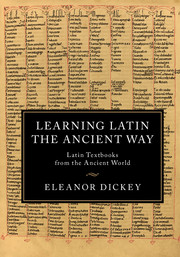1 - Introduction
Published online by Cambridge University Press: 05 March 2016
Summary
When we think of Latin learning in antiquity, we tend to picture little Roman children learning the language from their parents (or, more likely, their nurses and paedagogi). Such a vision makes the gap between the ancient Latin-learning experience and the modern one seem unbridgeable, for there is bound to be a vast difference between the experience of a language's native speakers and that of people who learn it as a foreign language. But learners of Latin as a foreign language also existed in the ancient world, and their experience is in some ways very close to our own: they learned declensions and conjugations, memorized vocabulary, used dictionaries and commentaries, and read Cicero's Catilinarians and Virgil's Aeneid, for example. In other ways, however, the experience of ancient Latin students was very different from ours, and in order to understand the differences it is crucial to know who the ancient Latin learners were: for example, since many of them were native speakers of Greek, they often struggled with the Roman alphabet but had no trouble with concepts like gender and declension.
Who learned Latin in antiquity?
The Roman empire had two main parts: the Western empire, where the main language was Latin, and the Eastern empire, where the main language was Greek. In both halves numerous other languages were also spoken at the time the Romans arrived, but as the centuries passed those other languages often died out. In the West, for example, the original languages of Italy, Gaul, and Spain had largely disappeared by the end of the Roman empire, as the inhabitants of those regions shifted to using Latin; that is why people in those countries now speak Romance languages descended from Latin. Such a language shift implies some foreign-language learning, but not necessarily sustained foreign-language learning: as soon as the inhabitants of the Western empire started speaking to their children in Latin rather than (or even in addition to) Gaulish, Etruscan, etc., those children grew up as native speakers of Latin and had no need to learn it as a foreign language. The fact that we have no Latin-learning materials from the West could be due to a relatively short period of foreign-language Latin learning, but it could also be an accident of preservation, since comparatively few non-literary texts survive from the ancient West in any case.
- Type
- Chapter
- Information
- Learning Latin the Ancient WayLatin Textbooks from the Ancient World, pp. 1 - 9Publisher: Cambridge University PressPrint publication year: 2016



